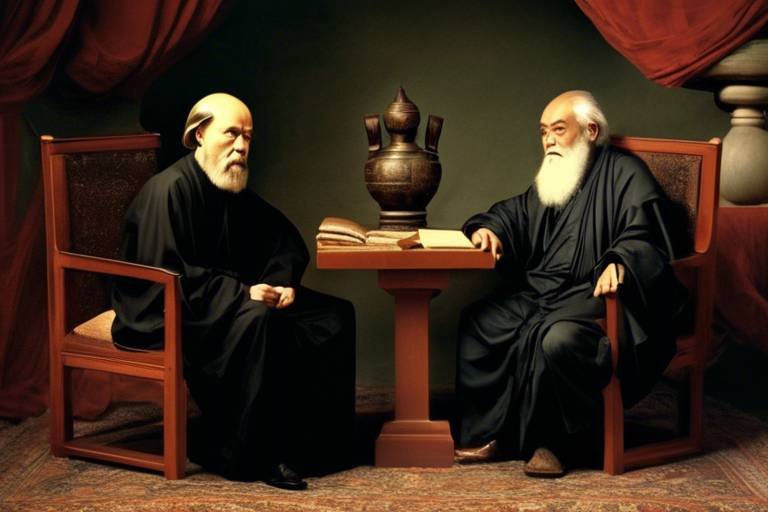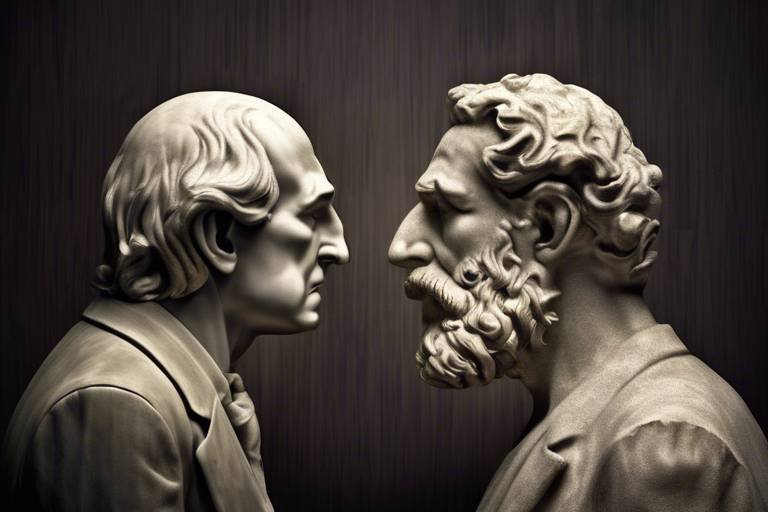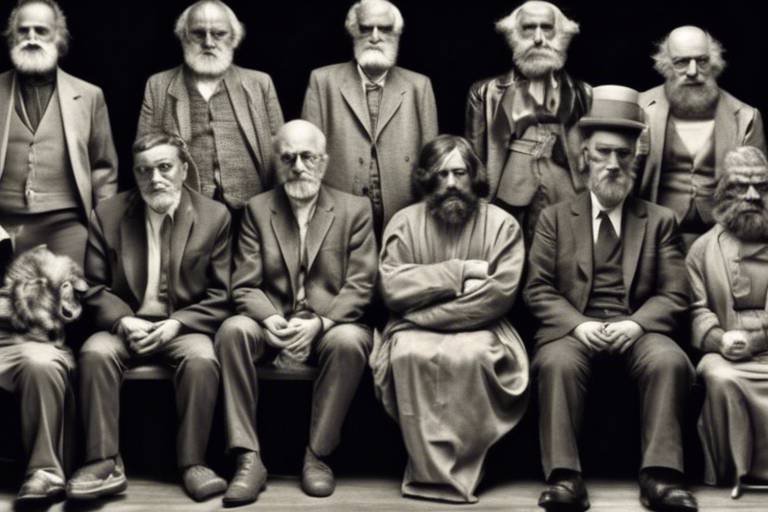The Influence of Eastern and Western Philosophers on Each Other
This article explores the profound interactions between Eastern and Western philosophical traditions, highlighting key figures, concepts, and the resulting synthesis that has shaped modern thought.
Understanding the historical backdrop of Eastern and Western philosophies provides insight into their development and mutual influences over centuries, revealing how cultural exchanges have enriched both traditions. The roots of Eastern philosophy can be traced back to ancient civilizations such as those in India and China, where thinkers like Confucius and Laozi laid the groundwork for ethical and metaphysical inquiries. Meanwhile, Western philosophy began with the Greeks, where Socratic questioning and rational thought paved the way for later philosophers like Plato and Aristotle. Over the centuries, trade routes, conquests, and the spread of religions facilitated a rich tapestry of dialogue between these two worlds, allowing ideas to flow freely across borders. For instance, the Silk Road was not just a trade route for goods but also a conduit for philosophical ideas, enabling the exchange of wisdom that would shape both Eastern and Western thought.
This section delves into the major Eastern philosophers, such as Confucius and Laozi, examining their core ideas and how they have influenced Western thought through concepts like ethics and metaphysics. Confucius emphasized the importance of moral integrity and social harmony, advocating for a society built on respect and responsibility. His ideas on ethics have had a lasting impact, influencing Western thinkers who sought to understand the nature of morality. Laozi, on the other hand, introduced the concept of Tao, or the "Way," which emphasizes living in harmony with the universe. This idea resonates with Western notions of balance and interconnectedness, showing how Eastern philosophies can complement Western thought.
Focusing on influential Western thinkers like Socrates and Descartes, this section highlights their foundational ideas and how their philosophical inquiries have been informed by Eastern perspectives. Socrates, known for his method of questioning, sought to uncover truth through dialogue, a practice that echoes the Eastern emphasis on introspection and self-awareness. Descartes, with his famous dictum "I think, therefore I am," laid the groundwork for modern philosophy, yet his explorations of doubt and certainty parallel Eastern contemplative practices that question the nature of reality. The interplay between these philosophical traditions reveals a fascinating dialogue that transcends cultural boundaries.
Exploring key philosophical concepts such as ethics, metaphysics, and epistemology, this section compares how Eastern and Western thinkers approach these themes, revealing both overlaps and divergences. For example, while Western philosophy often emphasizes individualism and rationalism, Eastern traditions tend to focus on collectivism and harmony with nature. This divergence is evident in ethical frameworks; Western ethics may prioritize rights and justice, whereas Eastern ethics often emphasize duties and relationships. Such differences enrich our understanding of human experience and morality, encouraging a more nuanced perspective.
This section discusses the impact of religious beliefs on philosophical thought in both Eastern and Western traditions, illustrating how spirituality shapes ethical frameworks and worldview perspectives. In the East, religions like Buddhism and Hinduism intertwine with philosophical thought, promoting ideas of karma, dharma, and enlightenment. In contrast, Western philosophy has been heavily influenced by Christianity, with concepts of sin, redemption, and the nature of the divine playing crucial roles. The synthesis of these religious philosophies has led to profound insights into the human condition, prompting questions about existence, purpose, and morality.
Examining contemporary philosophical movements, this section highlights how Eastern and Western philosophies have merged in modern contexts, fostering new dialogues and interdisciplinary approaches to age-old questions. Thinkers like Alan Watts and Thich Nhat Hanh have popularized Eastern thought in the West, emphasizing mindfulness and interconnectedness. Meanwhile, Western philosophers are increasingly drawing from Eastern traditions to address contemporary issues such as environmental ethics and social justice. This cross-pollination of ideas not only enriches philosophical discourse but also offers practical solutions to modern challenges.
This section investigates significant cross-cultural dialogues that have occurred between Eastern and Western philosophers, emphasizing collaborative efforts and the exchange of ideas that have enriched both traditions. Events such as the World Congress of Philosophy have provided platforms for thinkers from diverse backgrounds to share their insights, fostering mutual respect and understanding. These dialogues challenge preconceived notions and encourage a holistic approach to philosophy, highlighting the importance of collaboration in the quest for knowledge.
Discussing the broader implications, this section addresses how the interplay between Eastern and Western philosophies has influenced global philosophical discourse, encouraging a more inclusive understanding of diverse thought systems. As globalization continues to shape our world, the blending of Eastern and Western philosophies offers a rich tapestry of ideas that can address contemporary issues. By recognizing the value of diverse perspectives, we can cultivate a more comprehensive understanding of philosophy that transcends cultural boundaries.
- What are the main differences between Eastern and Western philosophies? Eastern philosophies often emphasize collectivism and harmony with nature, while Western philosophies tend to focus on individualism and rationalism.
- How have Eastern philosophers influenced Western thought? Eastern philosophers like Confucius and Laozi have introduced concepts of ethics and metaphysics that resonate with Western philosophical inquiries.
- What role does religion play in philosophy? Religion profoundly shapes philosophical thought in both traditions, influencing ethical frameworks and worldviews.
- Can Eastern and Western philosophies coexist? Yes, the merging of these philosophies fosters new dialogues and interdisciplinary approaches, enriching our understanding of complex issues.

Historical Context
To truly grasp the profound interactions between Eastern and Western philosophies, it's essential to understand the in which these traditions evolved. Over the centuries, various cultural exchanges have acted as bridges between these two rich philosophical landscapes, allowing ideas to flow and intermingle. From the ancient Silk Road that connected traders and thinkers to the colonial encounters of the modern era, the exchange of thoughts and beliefs has been a constant theme.
In ancient times, the philosophies of the East, represented by thinkers like Confucius and Laozi, were deeply intertwined with the spiritual and ethical fabric of societies such as China and India. These ideas emphasized harmony, balance, and the importance of community. In contrast, Western philosophy, with its roots in the works of figures like Socrates, Plato, and Aristotle, focused on rationality, individualism, and the pursuit of knowledge through questioning and debate.
As trade routes expanded and empires rose and fell, the interaction between these two worlds intensified. The Hellenistic period saw a merging of Greek and Eastern thought, particularly during the conquests of Alexander the Great. This period was marked by a significant exchange of ideas, where Eastern mysticism began to influence Western philosophical thought.
| Time Period | Key Events | Philosophical Influences |
|---|---|---|
| Ancient Era | Silk Road trade | Exchange of spiritual and ethical ideas |
| Hellenistic Period | Alexander's conquests | Fusion of Greek and Eastern philosophies |
| Middle Ages | Spread of Buddhism and Islam | Integration of mystical elements into Western thought |
| Modern Era | Colonial encounters | Introduction of Eastern philosophies to the West |
Fast forward to the Middle Ages, where the rise of Islam brought about another wave of philosophical discourse. Thinkers like Al-Farabi and Avicenna drew upon both Greek and Eastern philosophies, creating a rich tapestry of thought that would later influence European philosophers during the Renaissance. This period was pivotal as it reintroduced Western scholars to Eastern texts, sparking a revival of interest in metaphysical questions and ethical considerations.
In the modern era, the encounters between East and West became even more pronounced with colonialism and globalization. As Western powers expanded their reach, they brought Eastern philosophies back to Europe, often through the lens of Orientalism. This complex relationship has led to a synthesis of ideas, where Eastern concepts of mindfulness, interconnectedness, and holistic thinking began to permeate Western philosophical discourse.
Today, as we navigate a world increasingly defined by globalization and cultural exchange, the historical context of Eastern and Western philosophies serves as a reminder of our shared human experience. Understanding this interplay not only enriches our comprehension of philosophical traditions but also encourages a more inclusive approach to contemporary thought.

Key Eastern Philosophers
When we think about the profound impact of Eastern philosophy, a couple of names inevitably spring to mind: Confucius and Laozi. These thinkers didn't just sit around pondering life; they shaped the very fabric of Eastern thought. Their ideas have rippled through time, influencing not only their own cultures but also reaching far beyond the borders of the East to touch Western philosophy.
Confucius, or Kong Fuzi, is often regarded as the father of ethical thought in China. His teachings emphasized the importance of morality, social relationships, and justice. His famous quote, “What you do not wish for yourself, do not do to others,” encapsulates the essence of his philosophy, which revolves around the idea of reciprocity and respect. The concept of Ren (benevolence) and Li (proper conduct) are central to his teachings, encouraging individuals to cultivate virtues that promote harmony in society. This notion of ethical behavior has found its way into Western discussions about morality, particularly in the realms of deontological ethics.
On the other side of the philosophical spectrum, we have Laozi, the enigmatic figure behind Taoism. His work, the Tao Te Ching, is a treasure trove of wisdom that encourages followers to align with the Tao (the Way), a concept that emphasizes living in harmony with the natural order. Laozi's ideas about wu wei (non-action) challenge the Western notion of constant striving and achievement. Instead, he advocates for a more fluid approach to life, suggesting that sometimes the best action is inaction. This perspective offers a refreshing contrast to the often aggressive pursuit of success found in Western cultures, leading to intriguing dialogues about the nature of existence and fulfillment.
These two philosophers set the stage for a rich tapestry of thought in the East, but their influence doesn't end there. The teachings of Confucius and Laozi have been interpreted and reinterpreted over centuries, blending with other philosophical traditions such as Buddhism and Zen. This synthesis has created a dynamic framework for understanding human existence, ethics, and the cosmos. For instance, the Buddhist concept of interconnectedness resonates with Laozi's ideas about harmony, illustrating how these philosophies can complement each other rather than exist in isolation.
Moreover, the impact of these Eastern philosophies has transcended geographical boundaries. In the 20th century, Western thinkers began to explore these ideas, leading to a fascinating exchange of concepts. The rise of transcendentalism in the West, for example, was heavily influenced by Eastern philosophies, particularly the emphasis on nature and the self. Figures like Ralph Waldo Emerson and Henry David Thoreau drew inspiration from these Eastern traditions, weaving them into the fabric of American thought.
In conclusion, the contributions of key Eastern philosophers like Confucius and Laozi are not just relics of the past; they are living ideas that continue to shape our understanding of ethics, existence, and the interconnectedness of all things. Their teachings invite us to reflect on our own lives and challenge us to seek a deeper understanding of our place in the world. As we delve further into the synthesis of Eastern and Western thought, we uncover a rich dialogue that encourages us to think critically about the philosophies that guide our lives.

Key Western Philosophers
When we think about the giants of Western philosophy, names like Socrates, Plato, and René Descartes immediately come to mind. These thinkers laid the groundwork for much of Western thought, shaping our understanding of ethics, metaphysics, and epistemology. But what makes their ideas so compelling? How did they interact with the world around them, and what influences did they encounter? Let’s dive into the rich tapestry of Western philosophy to uncover the profound insights these philosophers offered and how they resonate with ideas from the East.
Socrates, often hailed as the father of Western philosophy, introduced the concept of dialectical reasoning, which is essentially a method of inquiry based on asking questions to stimulate critical thinking and illuminate ideas. His approach encourages us to question our assumptions and seek deeper truths. Imagine sitting down with a wise friend who challenges your beliefs; that’s the essence of Socratic dialogue. His influence is evident in the works of his student, Plato, who took Socratic thought and expanded it into a systematic philosophical framework. Plato’s theory of Forms, which posits that non-material abstract forms represent the most accurate reality, echoes with some Eastern ideas about ultimate truths, although it diverges significantly in its execution.
Moving forward in time, we encounter René Descartes, a pivotal figure in the development of modern philosophy. His famous declaration, “Cogito, ergo sum” or “I think, therefore I am,” encapsulates the essence of rationalism. Descartes emphasized the importance of doubt and questioning as a pathway to knowledge. He sought to establish a foundation for scientific inquiry that was free from the uncertainties that plagued earlier philosophical systems. This method of skepticism is not unlike the Eastern practice of Zen questioning, where the aim is to peel away layers of illusion to reach a core understanding. Descartes’ work laid the groundwork for future philosophers, including Immanuel Kant, who further explored the relationship between human perception and reality.
To truly appreciate the contributions of these Western philosophers, it’s essential to recognize their ongoing dialogues with Eastern philosophies. For example, the emphasis on rational thought in Western philosophy can be contrasted with the more intuitive and holistic approaches found in Eastern traditions. This interplay has led to a fascinating exchange of ideas, as seen in the works of later thinkers like Friedrich Nietzsche, who challenged conventional morality and introduced concepts such as the "will to power." Nietzsche’s ideas can be paralleled with Eastern philosophies that emphasize personal empowerment and the pursuit of self-actualization.
In contemporary philosophy, we see a blending of these rich traditions. The rise of comparative philosophy and intercultural dialogue reflects a growing recognition of the value in synthesizing Eastern and Western thought. Philosophers today are increasingly aware that many of the questions we grapple with—about existence, morality, and the nature of knowledge—are not confined to one cultural narrative. Instead, they are part of a larger, universal inquiry that transcends geographical and temporal boundaries.
As we explore the legacies of these key Western philosophers, it becomes clear that their ideas are not static; they continue to evolve and interact with other traditions, especially those from the East. This dynamic exchange enriches our understanding of complex concepts and fosters a more inclusive philosophical discourse. By engaging with both Eastern and Western thought, we open ourselves up to a broader perspective, one that encourages us to question, reflect, and ultimately grow.
- Who are some of the most influential Western philosophers?
Some of the most influential Western philosophers include Socrates, Plato, Aristotle, René Descartes, and Immanuel Kant. Each has made significant contributions to various fields of philosophy.
- How did Eastern philosophy influence Western thought?
Eastern philosophy introduced concepts such as holistic thinking, the importance of intuition, and ethical frameworks that emphasize harmony and balance, which have influenced Western philosophical discourse.
- What is the significance of comparative philosophy?
Comparative philosophy seeks to understand and synthesize ideas from different philosophical traditions, promoting a more inclusive understanding of diverse thought systems.

Comparative Philosophical Concepts
When we dive into the realm of philosophy, the differences and similarities between Eastern and Western thought become strikingly apparent. Each tradition has its own unique approach to fundamental concepts such as ethics, metaphysics, and epistemology. But how do these philosophies compare? Are there universal truths that bridge these cultural divides? Let's explore the fascinating interplay between these two rich traditions.
Starting with ethics, Eastern philosophies often emphasize the interconnectedness of all beings. For instance, in Confucianism, the focus is on relationships and social harmony. Confucius taught that one's moral duty is to cultivate virtues like benevolence and righteousness within the context of family and community. In contrast, Western ethics, particularly in the tradition of utilitarianism as proposed by thinkers like John Stuart Mill, often centers on individual rights and the greatest good for the greatest number. This divergence highlights a fundamental question: Is morality inherently social, or is it rooted in individual autonomy?
Next, let’s examine metaphysics. Eastern philosophies, particularly those influenced by Buddhism, often embrace a view of reality that is fluid and impermanent. The concept of anicca, or impermanence, suggests that all things are in a constant state of flux. On the other hand, Western metaphysics, influenced by Aristotle and later by Descartes, tends to focus on the existence of stable substances and the essence of being. This raises intriguing questions about the nature of reality itself: Is it a stable entity, or is it more akin to a river, ever-changing and elusive?
In the realm of epistemology, or the study of knowledge, we see another fascinating contrast. Eastern traditions often emphasize experiential knowledge, which is gained through meditation and introspection. For example, Zen Buddhism encourages practitioners to experience reality directly, beyond conceptual thinking. Conversely, Western epistemology, especially in the tradition of Rationalism and Empiricism, tends to prioritize logical reasoning and sensory experience as the primary sources of knowledge. This leads us to ponder: Is knowledge best acquired through direct experience, or through systematic reasoning and observation?
To further illustrate these comparative concepts, let’s take a look at the following table:
| Concept | Eastern Philosophy | Western Philosophy |
|---|---|---|
| Ethics | Focus on social harmony and relationships (e.g., Confucianism) | Emphasis on individual rights and the greatest good (e.g., Utilitarianism) |
| Metaphysics | Reality is fluid and impermanent (e.g., Buddhism) | Reality consists of stable substances and essences (e.g., Aristotle) |
| Epistemology | Experiential knowledge through meditation (e.g., Zen) | Knowledge through logical reasoning and observation (e.g., Rationalism) |
In conclusion, the comparative study of philosophical concepts between Eastern and Western traditions not only enriches our understanding of each but also prompts us to question our own beliefs. By engaging with these diverse perspectives, we can develop a more holistic view of philosophy that transcends cultural boundaries. So, are we ready to embrace this synthesis and explore the profound questions that lie at the intersection of these two worlds?
- What is the main difference between Eastern and Western philosophy? Eastern philosophy often emphasizes communal values and interconnectedness, while Western philosophy tends to focus on individualism and rational thought.
- How do Eastern philosophers approach ethics? Eastern philosophers, like Confucius, prioritize social harmony and the cultivation of virtues within relationships.
- What role does meditation play in Eastern epistemology? Meditation is seen as a vital practice for gaining experiential knowledge and understanding the nature of reality.
- Can Eastern and Western philosophies be reconciled? Yes, many contemporary thinkers are exploring ways to synthesize these philosophies, leading to a richer understanding of global thought.

Influence of Religion
Religion has always been a cornerstone of human civilization, shaping not only individual lives but also entire cultures and philosophical traditions. In both Eastern and Western contexts, religious beliefs have profoundly influenced philosophical inquiry, acting as a lens through which ethical frameworks and worldviews are constructed. For instance, in Eastern philosophies, the teachings of Buddhism, Hinduism, and Confucianism emphasize the interconnectedness of life, suggesting that personal ethics are intrinsically linked to the welfare of the community. This is starkly different from many Western philosophies, where individualism often takes center stage, particularly in the works of Enlightenment thinkers.
In Eastern traditions, the concept of karma in Hinduism and Buddhism illustrates how actions have moral consequences that reverberate through time. This idea encourages a reflective approach to ethics, urging individuals to consider the broader implications of their actions. On the other hand, Western philosophies, particularly those influenced by Judeo-Christian values, often focus on the notion of divine command ethics, where moral laws are seen as decrees from a higher power. This can lead to a more absolute view of morality, contrasting with the more fluid and context-dependent ethics found in many Eastern philosophies.
Moreover, the influence of religion extends beyond mere ethical considerations. It shapes metaphysical inquiries as well. For example, Eastern philosophies often embrace a cyclical view of time and existence, as seen in the concept of samsara in Buddhism. This contrasts with the linear perspective prevalent in Western thought, where time is often viewed as a straight path leading to a definitive beginning and end. These differing views on existence and time not only inform philosophical discourse but also impact how adherents of each tradition perceive their place in the universe.
Furthermore, the intersection of religion and philosophy can be seen in the way both traditions address existential questions. Eastern philosophies, particularly those influenced by Zen Buddhism, often advocate for a meditative approach to understanding reality, emphasizing direct experience over intellectual reasoning. In contrast, Western philosophers like Descartes and Kant employed rigorous logical frameworks to tackle similar questions, showcasing a fundamental divergence in methodology. This divergence highlights how deeply rooted religious beliefs can steer philosophical inquiries in distinct directions, leading to rich, yet often contrasting, intellectual traditions.
In contemporary society, the dialogue between these two spheres continues to evolve, with many modern philosophers drawing from both Eastern and Western religious traditions to create a more integrated philosophical approach. This synthesis not only broadens the scope of philosophical inquiry but also fosters a deeper understanding of the human experience, allowing for a more nuanced exploration of ethics, existence, and knowledge.
In summary, the influence of religion on philosophy is undeniable. It shapes ethical frameworks, informs metaphysical inquiries, and guides existential reflections. As we continue to explore the intricate tapestry of Eastern and Western thought, recognizing the role of religion in these philosophies allows us to appreciate the depth and diversity of human understanding.
- How does religion influence philosophical thought? Religion provides foundational beliefs that shape ethical frameworks and metaphysical inquiries, guiding how individuals understand their existence and moral responsibilities.
- Are Eastern philosophies more community-oriented than Western ones? Generally, yes. Eastern philosophies often emphasize interconnectedness and community welfare, while Western philosophies may focus more on individualism.
- Can Eastern and Western philosophies coexist? Absolutely! Many contemporary thinkers draw from both traditions to create a more holistic understanding of philosophical questions.
- What role does spirituality play in philosophy? Spirituality often informs ethical frameworks and worldviews, influencing how individuals approach philosophical inquiries and existential questions.

Modern Philosophical Synthesis
The landscape of modern philosophy is a vibrant tapestry woven from the threads of both Eastern and Western thought. This synthesis has emerged as a response to the complexities of contemporary life, where traditional boundaries between cultures are increasingly blurred. Philosophers today are not just confined to their cultural roots; they are actively engaging with ideas from across the globe. This cross-pollination of ideas has led to innovative approaches that challenge established norms and encourage a more holistic understanding of existence.
One of the most compelling aspects of this modern synthesis is its ability to address profound questions about the human experience through a multifaceted lens. For instance, concepts such as mindfulness, which originate from Eastern traditions, have found their way into Western psychology and therapeutic practices. These practices promote mental well-being and emotional resilience, showcasing how ancient wisdom can inform modern methodologies. Similarly, Western existentialism, with its focus on individual freedom and responsibility, resonates with Eastern ideas about interconnectedness and the nature of reality.
Moreover, the rise of interdisciplinary studies has created fertile ground for philosophers to explore new realms of inquiry. Fields such as comparative philosophy and global ethics are becoming increasingly popular, encouraging scholars to examine how different philosophical traditions can inform one another. This melding of perspectives is not merely academic; it has practical implications for addressing global challenges such as climate change, social justice, and technological ethics. By integrating Eastern and Western philosophical insights, thinkers can develop more comprehensive solutions that respect diverse cultural contexts.
In this modern era, we also witness a growing recognition of the importance of dialogue between different philosophical traditions. Conferences, workshops, and collaborative research projects are fostering environments where Eastern and Western philosophers can share their ideas and challenge each other's assumptions. This spirit of collaboration is essential, as it not only enriches philosophical discourse but also promotes mutual understanding and respect among cultures. The result is a dynamic exchange that continually shapes and reshapes our understanding of fundamental questions about life, morality, and the universe.
As we look to the future, the synthesis of Eastern and Western philosophies promises to yield even more profound insights. The ongoing exploration of consciousness, ethics, and human purpose will undoubtedly benefit from this rich interplay of ideas. By embracing a more inclusive approach, modern philosophy can transcend cultural boundaries and offer solutions that resonate on a global scale. In doing so, it not only honors the wisdom of the past but also paves the way for a more enlightened and interconnected future.
- What is modern philosophical synthesis?
Modern philosophical synthesis refers to the blending of Eastern and Western philosophical ideas to address contemporary issues and enrich understanding of the human experience. - How has Eastern philosophy influenced Western thought?
Eastern philosophy has introduced concepts such as mindfulness and interconnectedness, which have been integrated into Western psychology and ethics. - What are some examples of interdisciplinary studies in philosophy?
Examples include comparative philosophy, global ethics, and the study of consciousness, which draw on insights from both Eastern and Western traditions. - Why is dialogue between different philosophical traditions important?
Dialogue fosters mutual understanding, challenges assumptions, and enriches philosophical discourse, leading to more comprehensive solutions to global challenges.

Cross-Cultural Dialogues
The exploration of between Eastern and Western philosophers is not just fascinating; it's essential for understanding the rich tapestry of human thought. These dialogues have often acted as bridges, connecting diverse worldviews and fostering a deeper appreciation for the philosophical inquiries that transcend geographical and cultural boundaries. Imagine two rivers flowing together, each enriching the other’s waters—this is the essence of these dialogues.
One of the most notable instances of cross-cultural dialogue occurred during the Silk Road period, where traders, scholars, and travelers shared ideas alongside goods. Philosophers from the East, like Confucius and Laozi, found their teachings reaching the West, while Western thinkers such as Socrates and Aristotle were introduced to Eastern philosophies that emphasized harmony and balance. This exchange was not merely a one-way street; it was a dynamic interaction that allowed both sides to challenge and refine their own ideas.
In more recent times, the dialogue continued through the works of influential thinkers such as Gandhi and Martin Luther King Jr., who drew inspiration from both Eastern spiritual traditions and Western ethical frameworks. Their philosophies of non-violence and justice were profoundly shaped by the integration of these diverse perspectives. For instance, Gandhi's principles were deeply rooted in Hindu philosophy and Buddhist teachings, while also resonating with the Western ideals of liberty and equality.
Moreover, the 20th century saw the rise of comparative philosophy as a formal discipline, where scholars began to systematically analyze and compare Eastern and Western thought. This led to the emergence of new fields such as Eastern-Western philosophy and comparative ethics, which focus on the similarities and differences in moral reasoning and metaphysical beliefs. A prime example of this is the comparative study of Buddhism and Existentialism, where both traditions grapple with the nature of existence, suffering, and the search for meaning.
Today's globalized world further facilitates these dialogues. The internet and social media have become platforms for philosophers from different backgrounds to share their insights and challenge each other’s views in real-time. Online forums and academic conferences are bustling with discussions that reflect a blend of Eastern and Western philosophies, leading to a more inclusive and holistic understanding of complex issues such as ethics, governance, and environmental responsibility.
In summary, cross-cultural dialogues between Eastern and Western philosophers have played a pivotal role in shaping modern thought. By embracing the wisdom of diverse traditions, we not only enrich our understanding but also pave the way for innovative solutions to contemporary challenges. As we continue to engage in these dialogues, we must remain open-minded and willing to learn from one another, recognizing that the synthesis of ideas can lead to profound insights that benefit all of humanity.
- What are cross-cultural dialogues? Cross-cultural dialogues refer to the conversations and exchanges of ideas between different cultural and philosophical traditions, particularly between Eastern and Western philosophies.
- Why are these dialogues important? They are important because they promote understanding, encourage the sharing of diverse perspectives, and can lead to new insights that enrich both traditions.
- Can you give an example of a cross-cultural dialogue? An example would be the influence of Eastern philosophies, such as Buddhism, on Western existentialist thought, particularly in the context of understanding suffering and existence.

Impact on Global Philosophy
The interplay between Eastern and Western philosophies has had a profound impact on global philosophical discourse, creating a rich tapestry of ideas that transcend geographical and cultural boundaries. This synthesis not only enhances our understanding of various philosophical concepts but also encourages a more inclusive perspective on diverse thought systems. In a world that is increasingly interconnected, the dialogue between these two traditions has become more relevant than ever, prompting a reevaluation of established beliefs and practices.
One of the most significant impacts of this cross-pollination is the emergence of pluralism. Pluralism in philosophy advocates for the coexistence of multiple viewpoints, recognizing that no single tradition holds a monopoly on truth. This concept has gained traction as philosophers from both Eastern and Western backgrounds engage in meaningful discussions that highlight the strengths and weaknesses of their respective traditions. By embracing pluralism, modern thinkers can explore a broader range of ideas, leading to innovative solutions to contemporary problems.
Furthermore, the integration of Eastern and Western philosophies has enriched ethical discussions globally. For instance, the Western emphasis on individualism contrasts sharply with the Eastern focus on collectivism. This divergence invites a deeper exploration of ethical frameworks, prompting questions such as: How do we balance individual rights with community responsibilities? The answer lies in understanding how these philosophies can complement each other, fostering a more holistic approach to ethics that resonates with diverse cultures.
Additionally, the influence of Eastern thought on Western philosophy has been particularly notable in fields such as psychology and cognitive science. Concepts like mindfulness and meditation, rooted in Eastern traditions, have been embraced in Western therapeutic practices, leading to a more comprehensive understanding of human well-being. This blending of ideas illustrates how philosophical insights can inform practical applications, ultimately benefiting individuals and societies alike.
To illustrate the impact of this philosophical exchange, consider the following table that highlights key areas of influence:
| Area of Influence | Eastern Philosophy | Western Philosophy |
|---|---|---|
| Ethics | Collectivism, Harmony | Individualism, Rights |
| Metaphysics | Interconnectedness, Non-duality | Dualism, Rationalism |
| Epistemology | Intuition, Experience | Empiricism, Logic |
| Psychology | Mindfulness, Meditation | Cognitive Behavioral Therapy |
This table serves as a snapshot of how Eastern and Western philosophies have influenced various areas of thought, revealing both commonalities and differences. The result is a dynamic landscape of ideas that continues to evolve as scholars and practitioners engage in dialogue across cultures.
In conclusion, the impact of Eastern and Western philosophies on global thought is undeniable. As we navigate an increasingly complex world, the lessons learned from this philosophical exchange can guide us toward a more nuanced understanding of ourselves and others. By fostering an environment of mutual respect and curiosity, we can continue to explore the rich tapestry of human thought, paving the way for future generations to build upon the foundations laid by their predecessors.
- What is the significance of Eastern and Western philosophical dialogue?
This dialogue fosters mutual understanding and enriches philosophical thought, allowing for a more inclusive approach to complex issues. - How has Eastern philosophy influenced Western thought?
Eastern concepts such as mindfulness and collectivism have been integrated into Western practices, particularly in psychology and ethics. - What role does pluralism play in modern philosophy?
Pluralism encourages the coexistence of diverse perspectives, promoting dialogue and collaboration across different philosophical traditions.
Frequently Asked Questions
- What are the main differences between Eastern and Western philosophies?
Eastern philosophies often emphasize holistic approaches and the interconnectedness of all things, while Western philosophies tend to focus on analytical reasoning and individualism. This fundamental difference shapes their respective views on ethics, metaphysics, and the nature of reality.
- How have Eastern philosophers influenced Western thought?
Eastern philosophers like Confucius and Laozi have introduced concepts such as harmony, balance, and ethical living, which have permeated Western thought, particularly in areas like ethics and metaphysics. Their ideas encourage a more integrative approach to understanding human experience.
- Can you give examples of Western philosophers who were influenced by Eastern ideas?
Absolutely! Thinkers such as Ralph Waldo Emerson and Carl Jung incorporated Eastern concepts into their work. Emerson drew on Transcendentalism, which resonates with Eastern spirituality, while Jung explored the collective unconscious, tying in ideas from Eastern mysticism.
- What role does religion play in shaping Eastern and Western philosophies?
Religion profoundly influences both traditions. In the East, philosophies like Buddhism and Hinduism intertwine with spiritual beliefs, shaping ethical frameworks. In the West, Judeo-Christian values have historically guided philosophical inquiry, impacting moral reasoning and worldview perspectives.
- How are modern philosophical movements blending Eastern and Western ideas?
Modern philosophical movements are increasingly embracing a synthesis of Eastern and Western ideas. For instance, mindfulness practices rooted in Buddhism are now widely adopted in Western psychology, showcasing how cross-cultural dialogues can lead to innovative approaches to age-old questions.
- What are some significant cross-cultural dialogues between Eastern and Western philosophers?
Significant dialogues include the exchange between figures like Aldous Huxley and Eastern mystics, as well as the interactions at philosophical conferences that focus on comparative philosophy. These dialogues have enriched both traditions, fostering a deeper understanding of diverse thought systems.
- How has the interplay between Eastern and Western philosophies impacted global philosophical discourse?
The interplay has led to a more inclusive philosophical landscape, encouraging scholars to engage with a variety of perspectives. This cross-pollination fosters a broader understanding of human thought, promoting dialogue that transcends cultural boundaries.



















